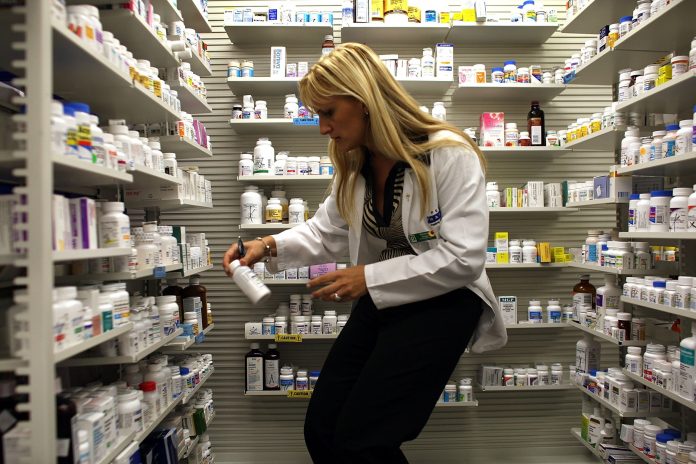


Rep. Diana Harshbarger (R-TN) introduced legislation on Sept. 14 that would eliminate some of the bureaucratic hurdles that pharmacists face when trying to sell bespoke drugs to patients. While Harshbarger’s press release notes that she is one of only two pharmacists in the House, it neglects to disclose that her son runs a firm that could benefit from the legislation and that many of her donors share similar business interests.
Harshbarger’s legislation, the Drug Shortage Compounding Patient Access Act, would make it easier for pharmacists at compounding pharmacies, establishments that manufacture custom non-Food and Drug Administration-approved drugs, to produce medications for patients when an FDA-approved drug prescribed to them is facing a national shortage. Donors linked to compounding pharmacies have showered Harshbarger with donations over the years, and Robert Harshbarger, the congresswoman’s son, serves as CEO of Premier Pharmacy, a compounding pharmacy that could stand to gain from the legislation.
Recommended Stories
- Congress is investigating this company for aiding the CCP. Its leaders have cut large checks to Democrats
- Kirk memorial to have heightened security due to 'threats of unknown credibility’
- Discord's links to shootings back in spotlight following Charlie Kirk assassination
Additionally, Harshbarger’s latest financial disclosure shows she draws a salary from Premier Pharmacy. Press reports and an interview with Harshbarger from recent years indicate that her family owns the pharmacy, and, according to Tennessee property records, the building the firm operates out of is owned by her and her husband.
In a statement to the Washington Examiner, a spokesman for Harshbarger denied that her family has a stake in the pharmacy.
“Congresswoman Harshbarger provides occasional medical consulting services to Premier Pharmacy based on her nearly 40 years of experience as a healthcare professional serving her local community,” the spokesman said. “Neither the congresswoman nor any member of her family has any ownership stake in Premier Pharmacy.”
Multiple family trusts, each of which could be used to hold Premier Pharmacy, appear on Harshbarger’s financial disclosures listing her as a trustee. In a February 2022 radio interview, Harshbarger confirmed that she and her husband own and did not sell Premier Pharmacy, but maintained that she “divested from it,” language that could track with the business being placed in a trust.
The congresswoman’s office did not respond to a follow-up inquiry asking about the contents of her trusts.
Harshbarger has a history of incorrectly representing her involvement in family business ventures.
The congresswoman repeatedly told Tennessee media that she had no role in American Inhalation Specialists, a pharmaceutical company that distributed counterfeit Chinese drugs to dialysis patients, resulting in a four-year prison sentence for her husband, who ran the firm, and nearly a million dollars in fines. WJHL, a local outlet based in northeast Tennessee, obtained records showing that Harshbarger was an officer at the firm and even took it over once her husband went to prison.
Premier Pharmacy shares the same business address that American Inhalation Specialists held before it went defunct.

Premier Pharmacy isn’t shy about its affiliation with Harshbarger.
On its website, the firm touts that Harshbarger and her son recently appeared at the 21st Annual Compounders on Capitol Hill event on behalf of their firm to meet with fellow industry leaders and “protect pharmacy compounding.”
Personal industry ties aside, Harshbarger’s campaign receives significant funding from organizations and individuals with a financial interest in compounding being made easier.
Notably, Harshbarger’s press release for her bill featured an endorsement from the Alliance for Pharmacy Compounding CEO Scott Brunner. However, the release did not disclose that his organization has provided her campaign with $25,000 in donations since 2019.
The National Community Pharmacists Association and Professional Compounding Centers of America have contributed $30,000 and $18,999 to her campaign since 2019, respectively. Harshbarger’s press release also touts an endorsement from the National Community Pharmacists Association.
Additionally, a significant number of pharmaceutical industry professionals are counted among Harshbarger’s donors.
Compounding pharmacy regulation, while niche, is a hotly contested issue in Washington, D.C.
Advocates of looser regulation argue that the practice is necessary to provide patients with custom drugs when the FDA-approved treatment for a given ailment is either not appropriate for their situation or physically unavailable. This can occur, as mentioned in Harshbarger’s bill, when a national shortage is underway or if a patient is allergic to an FDA-approved medication and requests that pharmacists modify it to retain its curative properties while negating whatever makes them allergic to it.
“The legislation in question does not represent new regulatory reforms, but rather a synthesis of previous legislative proposals and codification of long-standing federal guidances,” Harshbarger’s spokesperson told the Washington Examiner. “Its purpose is to strengthen patient access to essential prescription medications during times of urgent need. This bill builds on existing frameworks to ensure that patients, particularly those in rural or underserved areas, are not left without critical care due to red tape, outdated and ineffective regulations, or logistical delays.”
MEET THE BILLIONAIRE FUNDING CONSENSUS AT EVERY LEVEL OF THE HEALTHCARE DEBATE
There are roughly 7,500 pharmacies in the United States that specialize in compounding services, according to the American Pharmacists Association, and an estimated 1% to 3% of U.S. prescriptions are for compounded drugs.
On the contrary, advocates of maintaining or increasing regulation on pharmacy compounding claim that compounded drugs pose a higher risk than FDA-approved drugs. Thus, their producers should be subject to increased oversight from state boards of pharmacy. They also allege that some compounding pharmacies abuse existing regulations to sell bespoke medicine to patients who could take a federally approved medication instead, pointing out that the standards for producing compounded medications are lower than for FDA-approved drugs and could therefore prove risky for patients.
